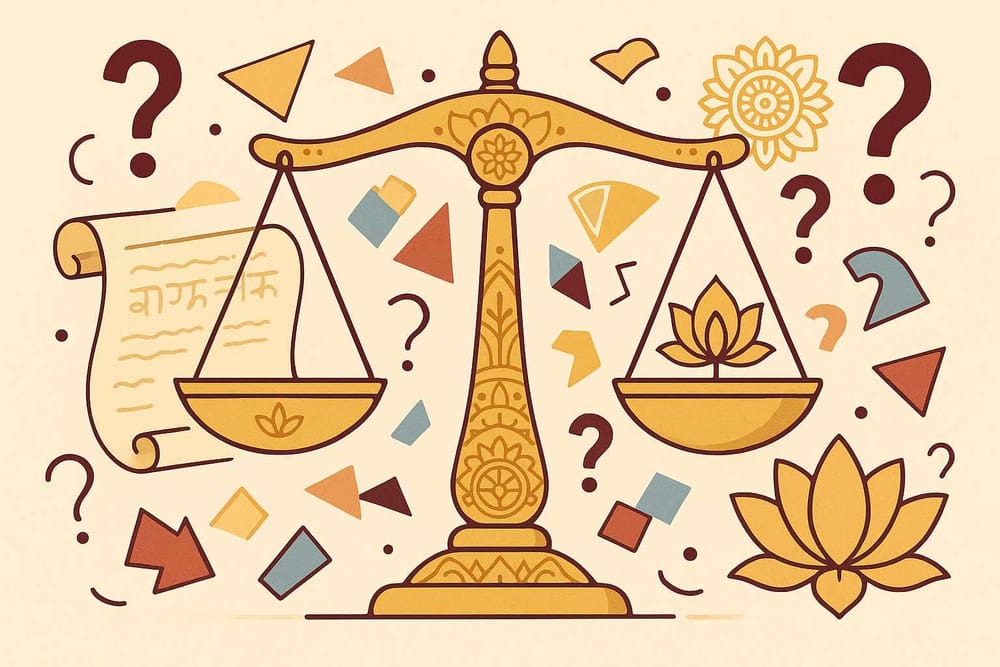
Hetvabhasa Explained: Fallacies in Indian Logic
Have you ever been in a heated family discussion or a debate with friends where you feel something is wrong with the other person's argument, but you just can't put your finger on it? It sounds logical, yet it doesn't lead to the right conclusion. It's a feeling we've all had. What if I told you that our ancient Indian sages had a name for this and a whole system to understand it? This is the world of Hetvabhasa, the ancient Indian science of identifying fallacies in reasoning.
This isn't just some dusty, old philosophical concept. It's a powerful tool for clear thinking that is more relevant today than ever. Let's take a journey back in time to explore this gem from the Nyaya school of philosophy and see how it can bring clarity to our modern lives.
The Fountainhead of Clear Thinking: Where Hetvabhasa Comes From
The term Hetvabhasa beautifully breaks down into 'Hetu' (reason) and 'Abhasa' (an appearance or illusion). So, it literally means an apparent reason that is actually faulty. This brilliant concept was first systematically laid out in the Nyaya Sutras by the great sage Akṣapāda Gautama. For him and the scholars of the Nyaya school, logic wasn't just an academic exercise; it was a path to discovering truth (Tattva-Jnana).
In ancient India, debates or 'Shastrartha' were a serious affair. They were not about winning an argument through loud words or clever tricks, but about arriving at the truth through sound logic. Hetvabhasa was the shield and sword in these intellectual duels, helping scholars to spot weak points in an opponent's reasoning and fortify their own. This deep commitment to structured debate shows how much our culture has always valued intellectual honesty and the pursuit of knowledge.
The Five Common Stumbling Blocks in Logic
Gautama identified five main types of Hetvabhasa that can lead our reasoning astray. Understanding them is like getting a new pair of glasses to see the world of arguments more clearly.
Badhita or Kalatita (The Contradicted Reason)
This is the fallacy that goes against our direct experience or another, more reliable source of knowledge (pramana). If someone were to argue, "Fire is cold because it is a substance," you wouldn't need a complex counter-argument. Your own direct perception (touching something hot near a fire) tells you the statement is false. The reason is contradicted by a stronger, undeniable truth.
Sadhyasama or Asiddha (The Unproven Reason)
This fallacy is like building a house on a foundation of sand. It occurs when the reason itself is not yet proven or established. For instance, arguing, "The sky-lotus is fragrant because it is a lotus, just like the one in the pond." Before we can even discuss its fragrance, we first need to prove that a 'sky-lotus' even exists! The entire argument rests on an unproven assumption.
Prakaranasama (The Neutralized or Counterbalanced Reason)
Have you ever seen a debate where both sides have equally strong-sounding arguments, leaving everyone confused? That’s Prakaranasama. It happens when there's another argument of equal weight that contradicts the first one, leading to a stalemate. No conclusion can be reached because both reasons neutralize each other, creating a sense of suspense and indecision.
Viruddha (The Contradictory Reason)
This is a fascinating one! Here, the reason given actually proves the exact opposite of what you're trying to argue. For example, if someone says, "Sound is eternal because it is something that is produced." The very act of being 'produced' means it has a beginning and therefore cannot be 'eternal'. The reason completely defeats its own conclusion. It’s an argument that collapses under its own weight.
Savyabhicara (The Inconclusive or Irregular Reason)
This is the fallacy of the 'straying' reason. It’s when the reason given for a conclusion is too broad and doesn't exclusively point to that conclusion. Think of it like this: someone says, "All people who wear saffron are sages." While some sages wear saffron, many other people might too for different reasons. The reason (wearing saffron) is not a definitive proof of the conclusion (being a sage). It’s an unreliable connection.
Why This Ancient Wisdom Still Matters in Our Digital Age
It's natural to wonder how these ancient Sanskrit terms apply to our lives filled with social media feeds and endless news cycles. The answer is: they are incredibly relevant. Understanding Hetvabhasa is crucial for developing sharp critical thinking skills. It helps us see through flawed arguments, whether they come from a politician, an advertisement, or a forwarded message on WhatsApp. It’s a way to ensure our conversations, both online and offline, are built on fairness and a genuine search for truth.
People often ask if studying Hetvabhasa can truly improve their reasoning. Absolutely. By learning to spot these common errors in others' arguments, we naturally become more mindful of our own. We start building our own points with more care, ensuring our reasons are solid, relevant, and consistent. It's a skill that helps in every aspect of life, from professional negotiations to simply having more meaningful conversations with loved ones.
Many are also curious about how Hetvabhasa compares to the logical fallacies taught in Western philosophy. While both systems aim to identify errors in reasoning, Hetvabhasa is uniquely woven into the fabric of Indian thought, emphasizing the relationship between the reason (hetu) and the conclusion (sadhya) in a profoundly interconnected way. You can explore more about the depths of our scriptures and their timeless wisdom in our article about Hindu scriptures, science, and spirituality.
Your Companion on the Path of Knowledge
At Bhaktilipi, we believe that understanding concepts like Hetvabhasa is a part of a larger spiritual and intellectual journey. Just as clear logic helps us navigate worldly debates, the timeless wisdom of our devotional literature helps us navigate the journey of life. We are dedicated to bringing you these profound insights in a way that is accessible and inspiring for today’s world.
If you feel a connection to this rich heritage and wish to explore it further, we invite you to become a part of our community. Subscribe to our newsletter for more articles that illuminate the mind and soothe the soul. Follow us on Facebook, Instagram, and YouTube to stay connected with authentic content that fuels your quest for knowledge and devotion.
A passionate group of people dedicated to preserving India's knowledge of Dharma, Karma, and Bhakti for ourselves and the world 🙏.
